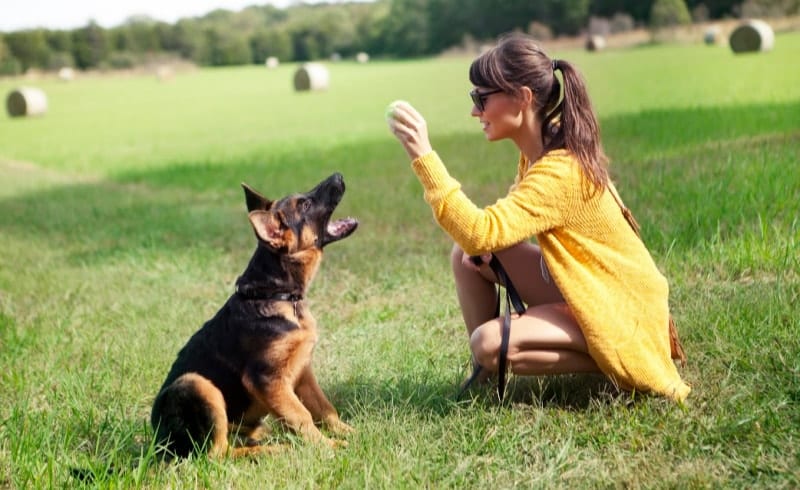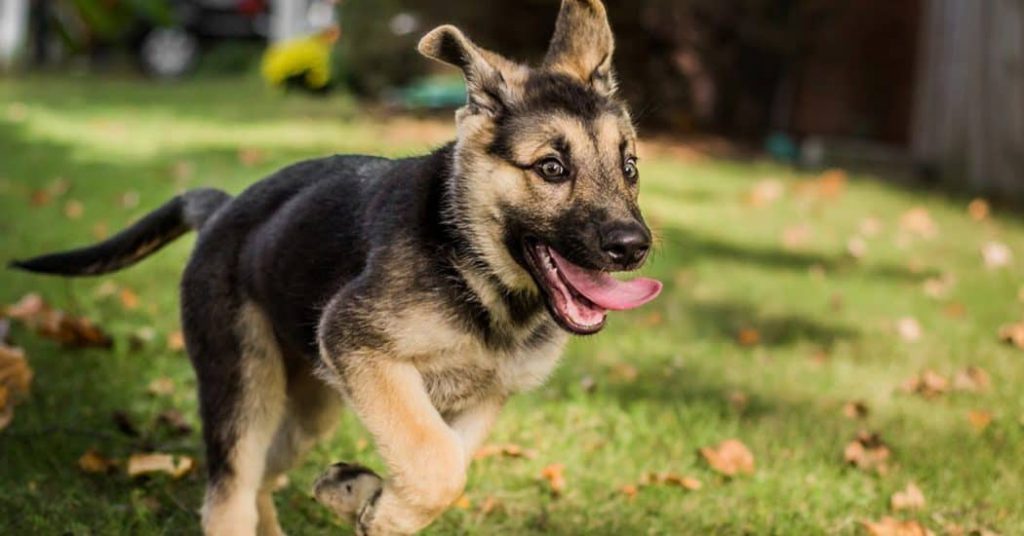When you first bring home your German Shepherd puppy, the last thing you want to worry about is training. That cute, bouncy little pup is too cute to be strict with, right? Unfortunately, training is most important when a dog is this young and their brains are so adaptive.
German Shepherd dog training is best accomplished by starting early, so start as soon as you bring your puppy home and continue until they are a year old. German Shepherd training must recognize the high energy and herding instinct of these dogs. Negative behavior must be dealt with in a consistent and kind manner, not by slapping, hitting and kicking. Positive behavior must consistently be rewarded both with praise and treats.

Between 8 and 14 weeks, many of a dog’s outlooks on the world will develop. If you do not help form them in the mold you want, it will take months or even years to correct what went wrong.
Be sure to instill strong commands and a sense of obedience in the dog from a very young age.
Your dog’s behavior may be modified at any time during it’s life. German Shepherd dog training is much easier if started with your puppy. It’s unfair both to the animal and the owner to let problems go unaddressed. Behavior problems lead to frustration for both dog and owner.

Socialization
Proper socialization with both people and other animals is very important, daily exercise and play are also very important and your German Shepherd must be a part of your family. Boredom and loneliness can lead to behavior problems.
Without spending time around other dogs at a young age, your puppy might grow fearful or aggressive towards all dogs. Other puppies also help each other to learn not to bite or attack other people or animals.
Crate Training
A very valuable part of German Shepherd puppy training is crate training. This training will help prevent separation anxiety.
So, at a young age, teach your puppy that they need to be left alone at times and that it will be done in a crate. Place them in a crate, sit beside them and give them treats and attention in slowly decreasing increments.
Eventually, your German Shepherd should be able to sit in his crate alone without making any noise. It is very important to never use the crate as a device for punishment as this will make them nervous when you go to place them inside the crate.
Early Obedience Training
A properly crate trained German Shepherd puppy will be far easier to potty train as they will figure out at a young age that they can hold their bladder. Puppies usually won’t soil their sleeping area.
Frequently remove your puppy to an area for waste elimination. If the puppy does have an accident, you can quickly rush them to the appropriate area. But, remember, accidents will happen, so be patient and consistent. These animals are very smart and will catch on quickly.
Most puppies don’t learn this until after house breaking begins.
So, that will save you lot of time in obedience training. However, when they reach 12 weeks of age, you can start teaching them basic commands.
If you plan on using a clicker, start teaching your puppy a young as 10 weeks that the sound of a clicker means something good.
From here, you can teach basic tricks like “sit”, “wait”, “speak”, or “lie down”.
A strong foundation of these four commands will make it incredibly easy to grow from there before your dog reaches 6 months and begins to settle into his behaviors.
This is also a good time for leash training. A puppy under 12 weeks does not generally have the patience for a 15+ minute walk on a leash.
However, once you reach the magic three month mark, you can start going on walks where the dog is expected to sit still and wait for you before moving forward. Use basic commands like “heel” to slow the dog’s progress. If your puppy doesn’t respond well, consider a lead collar or harness.
German Shepherd puppy training is not easy. No puppy training is easy. But, if you spend enough time learning how your dog reacts to your commands and spend a lot of time with him from a very young age; it also shouldn’t be too much of a strain.
Just remember – your dog needs a strong alpha figure throughout the training process. Without that figure, even the most vigilant of training may not work.
And with a dog that grows as large as a German Shepherd and has a history of unwanted and misguided aggression, it’s too dangerous to let them go without proper training.